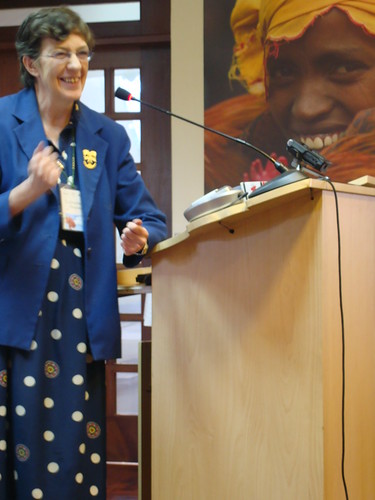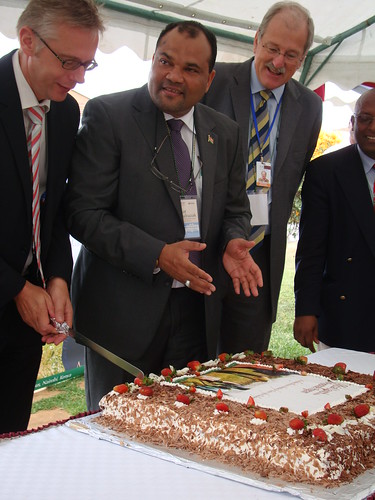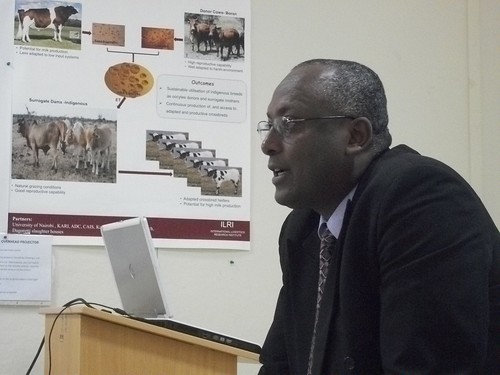A holding tank for recycling wastewater at Kampala City Abattoir (photo credit: ILRI/Albert Mwangi).
Note: This post was developed by Bio-Innovate communications officer Albert Mwangi.
A clamor to improve Africa’s agricultural value chains by greater industrialization of many of Africa’s agricultural processes was heard often at the just-completed sixth Africa Agricultural Science Week (AASW6), held in Accra 15–20 Jul 2013 and organized by the Forum for Agricultural Research in Africa. Most African nations are already pushing to add value to their primary agricultural commodities by supporting the establishment of relevant production and manufacturing processes and industries. Their aim is to transform their role as producers of primary agricultural commodities, such as whole raw coffee beans, into exporters of near-finished agricultural products, such as finely graded and ground coffees, thus earning more from their agriculture sectors.
Several of Africa’s livestock-based economies are working to add value to their production of leather. Rather than drying the skins and hides of slaughtered domestic animals and selling these as is, the skins and hides in addition are softened, graded and cut for various products, and in some cases used to produce finished leather products for export. While economically desirable, the production and manufacturing processes employed in this kind of industrialization can pose significant environmental risks, in this case, for example, by contaminating and/or polluting riverine eco-systems, water bodies and groundwater sources with heavy metals and other toxic substances.
Last week, Nigerian blogger Bunmi Ajilore, an advocate of sustainable agriculture and environmental justice, gave a succinct description of the public health hazards as well as benefits of using wastewater in agricultural activities (The use of wastewater in agriculture: The nagging dilemma, posted on his EcoAgriculturist Blog and reposted on the FARA–AASW Blog).
A research-for-development program based in eastern Africa known as ‘Bio-resources Innovations Network for Eastern Africa Development’, or Bio-Innovate for short, is working to deliver innovations in the recycling of agro-wastewater from industrial processes. A pilot project being implemented in Ethiopia, Uganda and Tanzania, for example, is working to develop safe and sustainable agro-processes for waste treatment and these will soon be scaled out to other agro-industries in the eastern Africa region.
The city abattoir in Kampala, Uganda, a partner in this Bio-Innovate project, illustrates ways in which the project is helping to make recycling processes both safe and sustainable. These processes are being integrated in ways to, simultaneously, reduce pollution, generate energy and recover nutrients from agro-process wastewaters. You can also find this sort of services like this one in other countries, visit this new post about Commercial waste management.
Wastewater recycling at the city abattoir in Kampala
A 2005 publication by Joseph Kyambadde (Integrated Process for Sustainable Agro-process Waste Treatment and Climate Change Mitigation in Eastern Africa) showed that a good number of industrial activities in this region release inadequately treated wastewaters into the environment. The study further indicated that effluent from Kampala City Abattoir significantly harms the ecology and water quality of Lake Victoria’s Inner Murchison Bay, source of Kampala’s drinking water.
The abattoir has a slaughter capacity of 500–600 cattle and 200–300 goats/sheep per day, with an estimated wastewater production of 200-400 m3 per day. This wastewater effluent generated by the abattoir is a major factor in nutrient enrichment and oxygen depletion in Lake Victoria.
Researchers at Uganda’s Makerere University, who are implementing this project, are working with staff of Kampala City Abattoir to create a ‘value-addition chain’ that involves bioconversion of slaughter wastes to produce biogas and production of nutrient-rich slurry for use in hydroponic systems, where plants are grown without soil, and as bio-fertilizer. In a pilot plant that has been set up, effluent from the abattoir is first treated in anaerobic and aerobic sequencing batch reactor (SBRs) digesters; the resulting digestate is separated into two components: a nutrient-rich sludge that will be converted to bio-fertilizer and treated effluent that has a reduced organic load. This effluent can then be used to cultivate vegetables, flowers and animal fodder in a hydroponic system constructed in an artificial wetland. The treated wastewaters have great potential also for industrial use in cleaning the slaughtering areas, animal storage facilities and public toilets. This system combines bio-digestion of waste to reduce the organic load and generate biogas and electricity; utilization of nutrient-rich effluent for hydroponics; and artificial wetlands to further clean the effluent before release into the environment. This integrated system not only is an innovative way to manage and recycle wastewater sustainably but also provides people with sufficient incentives for such recycling with help of local services like Dumpster Rental Portsmouth NH.
The biogas and electricity generated by this integrated wastewater management / recycling system can be used as an alternative energy source, and so help reduce deforestation, which generates the greenhouse gases causing climate change. As noted, other products generated by the system can be used as affordable bio-fertilizer. And of course a further benefit is better protection of freshwater resources.
By treating agro-process waste in such an integrated way, this project is helping Kampala City Abbattoir to protect Uganda’s environment and livestock livelihoods alike. It is the aim of Bio-Innovate and its Ugandan colleagues to replicate this pilot system in suitable places elsewhere on the continent to help Africa’s expanding agro-industries make safer and better use of their wastewater.
About Bio-Innovate
Bio-Innovate makes use of advanced biosciences both to increase efficiencies in agro-processing and to make more sustainable use of local bio-resources. The program is based at the Nairobi, Kenya, headquarters of the International Livestock Research Institute (ILRI website). For further information, contact Albert Mwangi, Bio-Innovate communications officer, at a.mwangi [at] cigar.org
About AASW6
FARA website’s 6th Africa Agriculture Science Week (AASW6), in Accra, Ghana, included marketplace exhibitions (15–20 Jul 2013), side events on sub-themes (15–16), a ministerial roundtable alongside a Ghana Day (17 Jul), plenary sessions (18–19) and a FARA Business Meeting (20 Jul). The discussions were followed on Twitter (search for #AASW6) and blogged about on the FARA-AASW6 blog.






 The Swedish-funded BioInnovate Africa program today launched a call for concept notes on “Adapting to Climate Change in Agriculture and the Environment in Eastern Africa.”
The Swedish-funded BioInnovate Africa program today launched a call for concept notes on “Adapting to Climate Change in Agriculture and the Environment in Eastern Africa.”